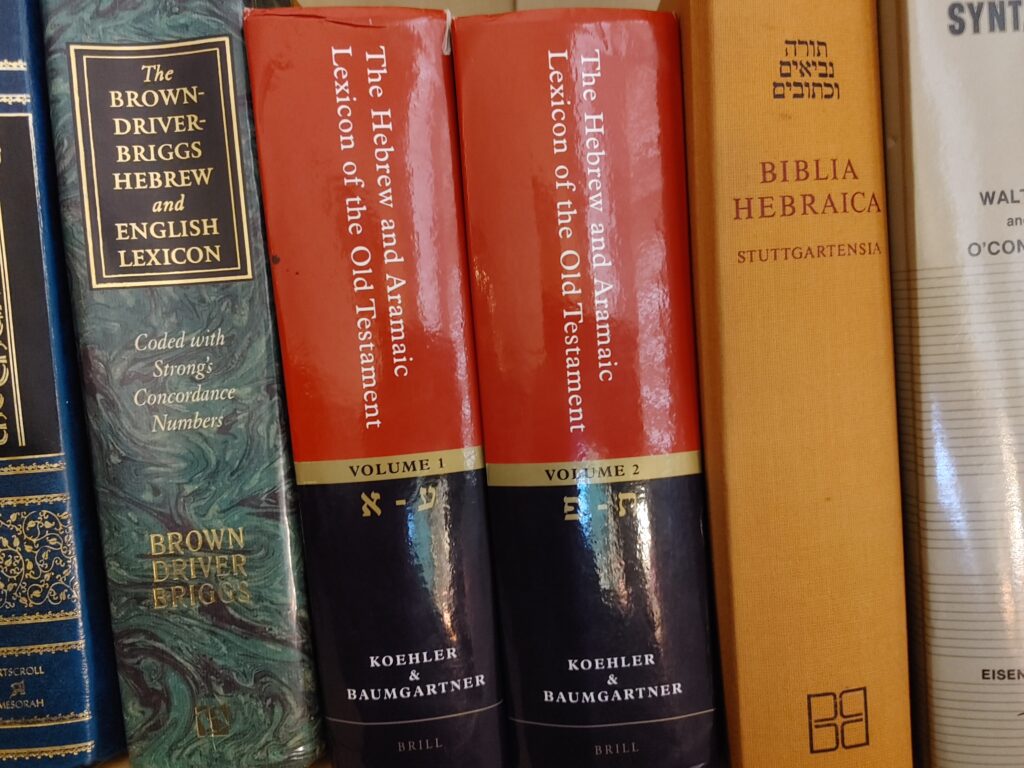A good Hebrew-English lexicon (or dictionary) is an indispensable tool for every student of biblical Hebrew. The list contains suggestions of the best lexicons on the market. Wherever possible, free online links and applications are provided.

Brown/ Driver/ Briggs: Hebrew and English Lexicon (BDB)
A trio of eminent Old Testament scholars—Francis Brown, R. Driver, and Charles Briggs—spent over twenty years researching, writing, and preparing The Brown-Driver-Briggs Hebrew and English Lexicon. Since it first appeared in the early part of the twentieth century, BDB has been considered the finest and most comprehensive Hebrew lexicon available to the English-speaking student. Based upon the classic work of Wilhelm Gesenius, the “father of modern Hebrew lexicography,” BDB gives not only dictionary definitions for each word, but relates each word to its Old Testament usage and categorizes its nuances of meaning. BDB’s exhaustive coverage of Old Testament Hebrew words, as well as its unparalleled usage of cognate languages and the wealth of background sources consulted and quoted, render BDB and invaluable resource for all students of the Bible.
Free Uses of the BDB Online:
2. Enhanced BDB. Click on the first letter of the root in the list at the bottom of the page. It takes you to a complete list of all the roots starting with that consonant
3. Mobile Phone Application: Look for “Parallel Plus” in your Phone’s App Store and modify the settings according to your preferences.
3. Biblebento – Provides parsing help for every word of the Hebrew Bible, provides linguistic annotations and and has an interlinear option for translators of the biblical text.
Watch this Video for Instructions on how to use the web service
Gesenius’ Hebrew and Chaldee Lexicon to the Old Testament
- The lexicon is outdated, but available as a download free online resource. The site provides easy access to the content with alphabetical hyperlinks
- 2letterlookup.com
Holladay: A Concise Hebrew and Aramaic Lexicon of the Old Testament
This book is an up-to-date lexicon (dictionary) of modest price and scope for the student of biblical Hebrew and Aramaic. Until now, the English-speaking student of Hebrew has had to choose between expensive and complex large-scale lexicons or pocket-size glossaries that make no pretense of keeping abreast of current scholarship. This edition is ideal for the beginning to intermediate student of Biblical Hebrew, offering Hebrew words definitions needed to translate Old Testament passages. Hebrew words are arranged in Hebrew alphabetical order by root form. This lexicon does not use Strong’s numbers. This edition is based on the first, second and third editions of Koehler-Baumgartner Lexicon in Veteris Testamenti Libros. Edited by William A. Holladay. Familiarity with Biblical Hebrew necessary.
Koehler/ Baumgartner: The Hebrew and Aramaic Lexicon of the Old Testament (HALOT)
Brill is pleased to present this Study Edition of the “The Hebrew and Aramaic Lexicon of the Old Testament” in two handy volumes. It has proven to be a valuable resource for scholars and students. In this Study Edition the complete vocabulary of the Hebrew Bible, including those parts of books which are written in Aramaic, is available. The dictionary combines scholarly thoroughness with easy accessibility, and so meets the needs of a wide range of users. The enormous advances that have taken place in the field of Semitic linguistics since the days of the older dictionaries of Classical Hebrew are well documented and assessed, as well as the often detailed discussions in modern Bible commentaries of words where the meaning is particularly difficult. But the alphabetical ordering of entries rather than the traditional arrangement of words according to their roots is particularly helpful to the new student, and also saves the advanced user much time. This 2 volumes edition is an unabridged version of the five volume edition of The Hebrew and Aramaic Lexicon of the Old Testament.
A Comprehensive Etymological Dictionary of the Hebrew Language for Readers of English by Ernest Klein
A clear and concise work on the origins of the Hebrew words and their sense development. Each of the c. 32,000 entries is first given in its Hebrew form, then translated into English and analysed etymologically, using Latin transcription for all non-Latin scripts. An indispensable source of biblical, Jewish, modern Hebrew and Near Eastern studies.
Opensource at archive.org: Download or read online